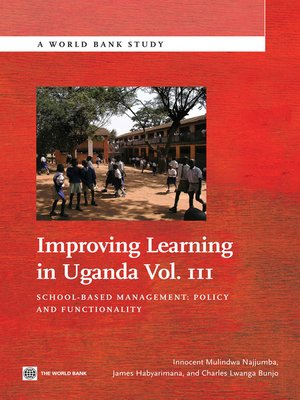Improving Learning In Uganda
ebook ∣ School-Based Management — Policy and Functionality · World Bank Studies
By Innocent Mulindwa Najjumba

Sign up to save your library
With an OverDrive account, you can save your favorite libraries for at-a-glance information about availability. Find out more about OverDrive accounts.
Find this title in Libby, the library reading app by OverDrive.



Search for a digital library with this title
Title found at these libraries:
| Library Name | Distance |
|---|---|
| Loading... |
Expansion of school systems through the ongoing mass education reforms in most developing countries not only translate into increased school enrolments but also increased human and financial resources at the school level. How these resources are managed is therefore central to the quest for quality and efficiency. This book therefore, is an attempt to provide insights on how schools are managed in Uganda in terms of policy and practice.
The book clearly shows that Uganda's primary education reform program is anchored on clear legislated policy framework supported by intensive provision of key inputs but weak school management practices. The conclusion is based on in-depth analysis of the policy evolution; capacity of School Management Committees (SMCs) including their autonomy and participation in school based management; support systems for SMCs and their functionality; beneficiary participation in school governance and response to education; information availability for accountability; and how schools are organized for learning.
The centrality of school based management to education quality and efficiency is well clarified in this book including the existing gap in policy with respect to beneficiary representation on SMCs. A three-pronged approach to strengthening school based management is also proposed for Government to consider. This would include capacity development for SMCs, improving the functionality of support structures, and enabling more information flow to the beneficiaries for accountability.
The results are of relevance to policy makers, government at the national and local government levels, and all actors in education including head teachers, teachers, school management committees, and parents.







